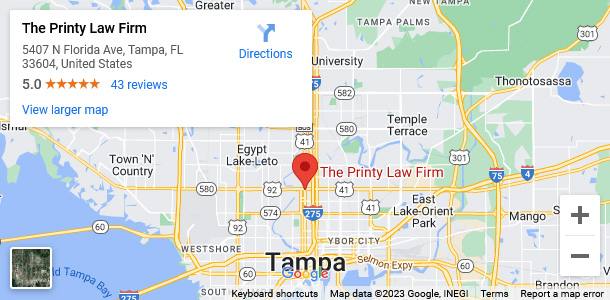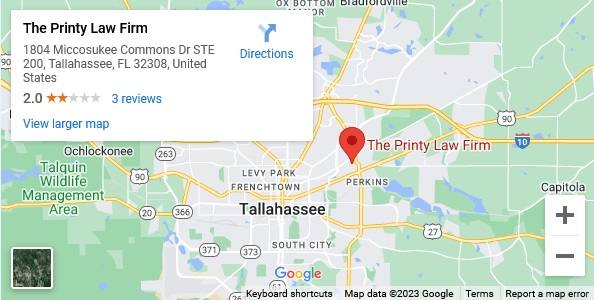uAre you thinking about filing bankruptcy? Are you afraid that you’ll lose what you own if you file for bankruptcy? Fortunately, the Florida Constitution offers various bankruptcy exemptions that can help protect your property from the reach of creditors. To better understand how this work, this article explains the specifics of Chapter 7 bankruptcy, and your constitutional rights to protect your property from creditors.
A Chapter 7 bankruptcy is a “fresh start.” This means that your unsecured debts such as credit card debts or overdue medical bills will be eliminated. Upon filing your case, the court will appoint a bankruptcy trustee to your case. This trustee will review your finances and assets and oversee your Chapter 7 bankruptcy. The primary concern among people when pondering bankruptcy is that they will lose their property. Luckily, there are many options available to prevent this from happening. One such option is exemplified by a so-called exemption. The Florida Constitution gives filers various Florida bankruptcy exemptions to help keep their assets from being sold by the trustee.
Imagine you have a basket where you place all of your assets and your liabilities. Any of your property claimed as exempt comes out of the basket. Exempt property is property that you do not have to turn over to your creditors. This means that you can keep exempt property after you complete your bankruptcy and it can positively contribute to your fresh start.
Does this mean that you can keep assets like your car, bank accounts, or home? It depends. Keep in mind that you can only use Florida bankruptcy exemptions to protect your property if you are eligible to receive them and if these exemptions provide enough value to protect your assets.
Are you Eligible to Receive and Use Florida Bankruptcy Exemptions?
If you have done some research on bankruptcy cases, you may have come across federal bankruptcy exemptions and state bankruptcy exemptions. To make matters simpler, Florida residents are only permitted to use Florida bankruptcy exemptions and are not permitted to use federal bankruptcy exemptions.
To be eligible to receive Florida bankruptcy exemptions, you must live in Florida for 730 days consecutive days before filing your bankruptcy petition. If you have not lived in Florida for 730 days consecutively, you must look at the 180-day period immediately before the 730-day period to observe which state you lived in at the time. You must live in that state for the full 180 days or a better portion of the 180 days (i.e. 91 days).
To illustrate this, imagine you didn’t live in Florida for 730 consecutive days before filing your bankruptcy petition. Instead, you lived in Michigan. You would be eligible to use Michigan (or Federal) bankruptcy exemptions as long as you lived in Michigan for the 180 days or at least 91 days immediately before the 730 days required to file your bankruptcy petition.
What are the Available Types of Exemptions that You Can Use?
Florida’s Homestead Exemption
The Florida homestead exemption protects real property including your home, condominium, mobile home, or modular home. This exemption is unlimited in value. But there is a catch. This exemption places restrictions on the size of your property. Stated simply, you can protect the entire value of your property as long as it is not larger than half an acre inside city limits or larger than 160 acres outside city limits.
Florida Personal Property Exemptions
There is no shortage of exemptions available to you to protect your personal property. The Florida Constitution gives you a $1,000.00 bankruptcy exemption that allows you to keep your furniture, appliances, electronics, clothes, jewelry, and other similar items. Florida statutes also permit specific personal property exemptions that can protect certain education savings, prescribed health aids, bank accounts, and even cash.
Typically, the attorney helping you complete your bankruptcy petition will ask you to list all of your personal property and help provide a value for each item. Valuing your property can be difficult; however, it may be helpful to know that you can value each item based on the average cost of a similar item of the same age and condition. Just think, what would I sell this for at a garage sale, eBay, or Craigslist? While this tactic can be helpful for household goods, furnishings, jewelry, and other miscellaneous personal property items, consider using Kelly Blue Book or NADA when valuing a car.
Florida Motor Vehicle Exemption
So far, you have learned that your house and personal property can be protected. But what about your car? You can exempt up to $1,000 in your car’s equity. If you don’t have a car loan, your equity in your car is the same as the car’s current value. So, if your car is worth $1,000 your equity is also $1,000 and you can protect your car from liquidation.
If you have a car loan, the equity in your vehicle is the difference between your car loan’s balance and how much your car is worth. Suppose you owe $10,000 on your car loan. Your car is currently worth $11,000. The difference is $1,000, which is the equity in the car. So, you may use the $1,000 exemption given to you to exempt the $1,000 equity in the car to keep it.
However, you may experience complications when you have more equity in your car than exemptions available to exempt it. For example, you owe $10,000 on your car loan. Your car is currently worth $17,000. The difference is $7,000, which is your equity in the car. You know that you only have a $1,000 exemption given to you to exempt your car to keep it. However, after you use the $1,000 motor vehicle exemption, $6,000 worth of equity is considered non-exempt. What do you do? There are some options available that your attorney can discuss with you further at a consultation.
Florida Wildcard Exemption
The Florida Constitution allows filers to claim up to an additional $4,000 wildcard personal property exemption if the filer is not eligible for the Florida homestead exemption. You may use this exemption to keep a car, money in a bank account, or any other personal property subject to your discretion.
Can I Mix and Match my Florida Bankruptcy Exemptions?
The most frequently asked question among filers regarding Florida exemptions is whether they can use multiple exemptions toward a single piece of property. The answer isu yes!
Suppose you rent your home and you are not eligible to use a homestead exemption. So, you qualify for a $4,000 wildcard personal property exemption. You only have $5,000 worth of furniture, jewelry, electronics, and other household goods. Clearly, you can use a $1,000 personal property exemption toward your furniture and other household goods. But what happens to the remaining $4,000 worth of household goods? You can still protect these household goods by using your $4,000 wildcard personal property exemption toward them. Keep in mind that this example is very specific to a situation where you qualify for a $4,000 wildcard personal property exemption. If you own your home and do not rent, you would only be permitted to use a homestead exemption and not a wildcard personal property exemption.
Even so, the general rule is that the title of the exemption usually hints at the property it is used to exempt. For example, a $1,000 motor vehicle exemption cannot be used to exempt furniture because furniture does not qualify as a motor vehicle. However, the wildcard personal property exemption can be used to exempt any personal property as discussed above i.e. your motor vehicle.
Other Exemptions
The Florida bankruptcy exemptions discussed above are the most commonly used exemptions. However, there are many more exemptions that can be used depending on your interests. Sometimes, Florida residents are eligible to use federal non-bankruptcy exemptions contained in the federal law if their situation permits. To find suitable Florida bankruptcy exemptions or federal non-bankruptcy exemptions for your needs, please do not hesitate to contact Printy Law Firm online or call (813) 434-0649 for a free consultation.





